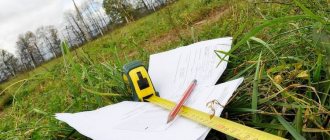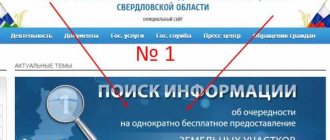Is it necessary to privatize the dacha?
This question usually arises among owners of buildings on a summer cottage, when the land has already been privatized and belongs to the owner according to official documents. Experts argue that this needs to be done, especially since the dacha amnesty, valid until 03/01/18, allows this to be done quickly and without any problems.
As for the situation when neither the plot nor the house on it is privatized, and citizens use the property, for example, under a social tenancy agreement, then after 5 years of no action by the owner, this property becomes the property of local municipal authorities, so they have every right ask to vacate the occupied territory.
Consequences of failure
Is it possible to refuse and not privatize land that is used for a garden or vegetable garden? You can do this if there is no interest in this land plot. For other reasons, there is no need to postpone privatization, which is free for members of the partnership and (for many) simplified.
Refusal to register will have negative consequences for the gardener:
- A non-privatized garden or vegetable plot will now be considered someone else's territory. The owner of the land, even if he has grown a garden or built a garden house, can be evicted from the plot. The local municipality has this right of eviction.
- If you do not receive a certificate of ownership before the end of the land lease, it will be extremely difficult to re-register it.
Owners of neighboring plots who want to have a privatized plot in their personal property will carry out cadastral work during registration and call a land surveying specialist. During the establishment of boundaries, the area not formalized by law may be reduced.
Therefore, it is worth taking advantage of the opportunity of free privatization, properly formalizing and registering the plot, to which now no one will have any rights except its owner.
Privatization procedure
A summer cottage is a favorite vacation spot for many citizens. After the dacha has been purchased, you should not hesitate to formalize its privatization, since this action will not only make the buyer the full owner of the property, but will also provide the opportunity to dispose of it at his own discretion.
All individuals who do not own property can apply for privatization rights. Any immovable object on a summer cottage can be registered as ownership if it is not in disrepair and is not an office premises.
The privatization of dacha buildings is carried out by a special service under the local administration of the locality where the property is located. The privatization process is a rather troublesome task, requiring numerous procedures :
- First of all, it is necessary to resolve the problem with the land on which the building is located. When purchasing land, the owner registers it in his name and then takes possession of the site. He automatically becomes a member of the dacha cooperative, which gives him the opportunity to privatize the dacha for free. Membership in the cooperative is confirmed by a book, which is issued to the owner of the land by the management of the cooperative.
According to the legislation of the Russian Federation, it is possible to privatize only those land plots that were received for use before 2001. In addition, there are lands that are prohibited from privatization (Article 27 of the Land Code). Read more about how to buy land from the state.
- It is necessary to draw up the boundaries of the land plot. The cadastral chamber is responsible for drawing up this document. The owner makes an application, cadastral engineers go to the site and take the necessary measurements. After a set time, the owner receives a cadastral document with a description of the object and designation of its boundaries. The passport must be signed by the head of the board of the summer residents' cooperative. The owner can independently draw up a description of the boundaries of his site, but in this situation it is wiser to leave this to specialists. Read more about registering a land plot with cadastral registration here.
- The owner of the plot must contact the local Department of Land and Property Relations with an application for the privatization of the dacha building. Documents must be attached to the application in accordance with the established rules.
The Department is given up to 2 weeks to review and prepare privatization documents. During this time, additional documents may be required from the owner, depending on the specific conditions of registration. After the Department issues the documents, the dacha owner transfers them to Rosreestr for final registration. Rosreestr registers a citizen's right to a dacha building and land and issues an extract from the Unified State Register of Real Estate, officially confirming this fact.
It is recommended that you first familiarize yourself with the legislative acts covering the privatization process or consult a lawyer. The laws contain all the rules and regulations according to which a summer cottage and buildings on it can be transferred into ownership according to a simplified scheme, after which they can be disposed of at their own discretion.
How to make an application?
An application to the local administration office is drawn up addressed to the head of the executive committee. It states:
- location of the dacha;
- type of right to land in common joint ownership;
- date of allotment of the land plot or purchase of the dacha.
The following indicate the significant factors relevant to the stated procedure. These may include:
- bona fide possession of the site;
- no arrears in payments and taxes;
- presence (absence) of buildings;
- request for privatization and reason for privatization.
The application for registration of property rights can be downloaded free of charge in MS-Word format.
It is necessary to indicate the fact that the right to freely re-register land as a property has not been used, and to put a date and signature.
Attached documentation
Depends on the nuances of the procedure and the availability of certain documents.
Be sure to introduce yourself:
- civil passports of applicants;
- certificates of the type of right;
- cadastral passports;
- extract from the minutes of the general meeting of summer residents;
- certificate from the board confirming the absence of debt.
Representatives acting in the interests of the dacha owner are required to present their own passport and a notarized power of attorney.
If leased land is privatized - a lease agreement. For individual representatives - a copy of the lease agreement and a land survey document for the allocation of their own share.
An approximate sample of a land lease agreement with the municipal government can be downloaded and viewed in MS-Word format.
Required documents
To carry out the privatization procedure, the owner of the dacha must provide a package of required documents :
- application according to the established form;
- copy of passport;
- cadastral plan of the site;
- documents that confirm ownership of the land and buildings on it;
- technical passport for real estate objects located on the site.
The application for privatization has a standard format and contains the following points:
- name of the authority to which the application is submitted;
- applicant details: full name, residence and registration address, contact details;
- a request for the transfer of ownership of the building with reference to the Federal Law “On the Privatization of Housing Stock” indicating the address of its location;
- list of documents attached to the application;
- signatures of all alleged owners with transcripts;
- date of application.
You can download a sample application for privatization of a dacha here, and a sample application for privatization of a plot of land for a dacha - here.
The deadline for processing documents may be extended if the applicant has completed the application incorrectly or provided an insufficient number of documents.
When the plot is leased
If the land being used is leased from local authorities, you can try to get it into private ownership. To do this, you need to contact the authorities of the district in whose territory the land share is located. Only after officials have reviewed it and an approving decision has been made can the registration of land ownership begin.
It is possible that the local administration will not want to transfer property into private hands, but there must be clear legal grounds for refusal. It is worth familiarizing yourself with these arguments and, if prospects are discovered, you should try again after some time, securing your own arguments. If the result of consideration of the application is positive, all further procedures take place on a general basis.
Duration and cost of the procedure
The dacha privatization procedure does not require capital investments, but the owners must pay a state fee for registration and review of documents. Its amount does not exceed 200 rubles when preparing documents for a summer cottage plot, for garden plots - 100 rubles.
The deadline for free registration of ownership of all types of real estate for citizens of the Russian Federation has been extended until March 1, 2021. The period for free privatization of land under structures has been extended until December 31, 2020.
The procedure for privatization is simplified as much as possible for owners in the Federal Law on privatization. The new legislative act was called the “dacha amnesty.” It was introduced to facilitate and speed up the process. The state, in turn, will receive additional revenues to the budget from paying real estate taxes.
Duration of the procedure for reviewing documents for registration:
- privatization in the Department of Land and Property Relations at the municipality - 2 weeks;
- production of a cadastral passport – 1 month;
- registration with Rosreestr – 10 days.
The deadlines may change upward if the applicant made errors in the preparation of documents or specialists have other questions that will require time to resolve.
In general, privatization of real estate on a summer cottage can last 6-8 months. The duration of the procedure depends on the correct execution of the sequence of actions by the owner, compliance with the rules for collecting documents according to the list, and the correctness of the application.
Procedure and rules for privatization of land plots
The order and rules are determined by the nuances of the procedure being carried out. If individual gardeners are engaged in re-registration of their own dacha lands, their right to take advantage of the dacha amnesty provision may be retained.
Such landowners will be able to re-register the allotment free of charge through a simple re-registration of the right: from the one existing at the time of registration - to the right of ownership. But such relaxations depend on regional regulations, which could extend this legal precedent, or could cancel it in May 2015 or later.
If the dacha amnesty has ceased to apply in the locality where the land plot is located, additional actions will be required, including contacting the head of the local administration.
Such an appeal will also be required from the founder of an NPO who uses leased municipal areas and plans to transfer them to the common shared ownership of members of a gardening partnership. The same is provided for individual initiators of the privatization of leased municipal lands.
The administration considers the submitted documentation and application based on the provisions of the Law on Privatization, which entered into legal force on July 4, 1991, under No. 1541-1, and also based on regional and local regulations and acts.
Subject to compliance with the rules and regulations, a positive decision is made and issued to the applicant in the form of an extract. This extract is attached to the documentation package for participation in the registration procedure. To receive it, you will need a period of time approximately equal to a calendar month.
Privatization using a garden book
After registering ownership of a dacha plot, citizens automatically become members of the dacha cooperative. Evidence of this is the dacha book, which is issued to the owners by the board of owners. It confirms the fact of membership in the cooperative, characterizes the plot of land, and subsequently records all tax payments.
The “dacha amnesty” gives the owner the right to submit documents for the privatization of a dacha on the basis of a garden book. In addition to this, other available documents for the land and house, a copy of the owner’s passport and a receipt for payment of the state duty are provided. It is believed that the garden book contains enough official information about the land plot and the buildings on it to serve as the basis for making a positive decision on privatization.
In addition, the applicant must provide a certificate that confirms ownership of the land, according to the garden book, and contains a diagram of the land plot. This certificate is issued by the chairman of the board of the dacha cooperative.
Arbitrage practice
Quite often, citizens are faced with an unjustified refusal by the executive body to transfer a land (dacha) plot into private ownership. Since often the administrations to which applications are submitted do not take into account the fact that the site is in the use of the applicant before the Land Code comes into force (until the end of October 2001), such situations can be resolved in court. That is, you need to draw up a statement of claim and attach the necessary documents. Based on practice, the court takes the applicant’s side.
If the material was useful, you can share it on social networks. Share your experience in the comments. If you have questions, our lawyer will answer them promptly.
Possible difficulties
Difficulties may arise during privatization, despite the fact that the “dacha amnesty” has significantly simplified the process:
- The external boundaries of the land plot have been violated, and information about the area of the plot does not coincide with the cadastre. In this case, you will have to re-register the documents at the cadastral chamber.
- The horticultural partnership, as a legal entity, does not comply with the requirements imposed on it, for example, it violates fire safety and sanitary standards.
- Failure to pay SNT taxes or fines.
- Violations in SNT documentation: about the presence of land users, information about areas, unreasonable registration of excess areas, etc.
If there are violations on the part of the board of the dacha cooperative, privatization may be refused, but the owner can appeal the refusal in court. Refusal due to the fault of the owner may be due to incorrect execution of documents, insufficient number of documents, or non-payment of state duty.
The Department of Land and Property Relations at the municipality of the locality, which is responsible for registering ownership of dacha plots and buildings on it, has the right to refuse privatization to the applicant. The refusal must be made in writing on official letterhead. It must indicate the reasons for the refusal, the document is signed by an official and supported by the department’s seal. With this document, the applicant can apply to the court to appeal the decision that, in his opinion, is unauthorized.
The refusal and its reasons should not be irremovable, therefore, most often, going to court becomes a last resort for the applicant. Typically, citizens eliminate shortcomings on their own and put documents in proper order. To avoid refusal, you should be more careful in preparing documents: pay attention to their relevance and reliability, completeness of information.
Before going to court, the law suggests resolving the controversial issue pre-trial, that is, filing a complaint with a higher authority - the territorial division of the State Property. The complaint is given 15 days to consider. Thus, the pre-trial procedure for resolving the problem is observed, and the case does not come to trial.
Special rules for registering land in a gardening partnership
What are the features of the privatization of a land plot in a garden partnership from all other privatizations? The key feature is that garden, dacha and vegetable plots are subject to a law called the “Dacha Amnesty”. Under this law, a simplified procedure for registering ownership of state land has been introduced.
You only need to provide a very short package of documents, fill out a declaration and pay the state fee.
The second feature is the land surveying procedure. Some plots have a cadastral passport, which means that land surveying has already been carried out. But some plots go to their owners without such a document, which means that before privatization it is necessary to carry out this procedure in order to obtain a cadastral passport.
If there is a site plan, you can find out about this at the Cadastral Chamber. If available, the passport will be issued within two weeks. This feature is typical specifically for SNT, since most of them were organized even before the introduction of the Land Code of the Russian Federation.
The legislative framework
All questions about privatization are reflected in special regulatory documents:
- Federal Law No. 178 of 12/21/2001
- Federal Law No. 66, 2002
- Federal Law No. 93 dated June 39, 2006
- Federal Law No. 101 “On the turnover of agricultural land”, 2002
- Civil Code of the Russian Federation (Article 209, Article 129)
- Land Code of the Russian Federation No. 136 of October 25, 2001 (Article 39.36)
Legislative acts provide that land plots and buildings located on them must be privatized. At the same time, building owners received the right to a special procedure for privatization.






